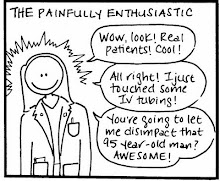Sorry man, what grand things you think you learned in your overactive imagination are actually just your hospital's filing system and prescribing preferences. You'll have to learn it again when you change locations.
Give me a break. You seriously think you can learn Ob/Gyn, Peds, Surgery, Neuro, Psych, FM, and Internal medicine in 4-5 weeks?
The amount of facts alone would take longer than 4-5 weeks. That part is simply book learning. There is a tremendous amount of information that is absorbed throughout the year. The repetitive reinforcement is what solidifies it in our minds.
The experience I was talking about was not the "filing system" you are referring to. Guess what being a physician is a people-job. You have to learn to communicate on all levels. Part of that means writing effective notes. It also means calling consults, speaking with nurses, presenting on rounds and to residents and collecting information by reading consult notes, nursing notes, PT notes, finding labs etc. These skills take time to develop. You don't just write a couple of notes and you're ready to take care of patients. No, it takes weeks of speaking with patients, following up with daily information and presenting frequent to get really good at it.
How about learning to interpret labs and imaging? What, you read one CXR, one EKG and you think you're the expert? There are numerous permutations of what can occur and the exposure in third year allows improvement.
And lets not even mention procedures. For example, inserting an IV is relatively simple theoretically but given the variable anatomy in veins, one has to get a good feel of the needle and 3D visualization of insertion of the needle within the vein to get truly good at that procedure. There are subtle difference to how fast you insert the needle, what angle you insert it, how quickly and when you drop the angle, coupled with simultaneously holding the skin taught and using one finger to advance the catheter. The same idea will be the same for delivering babies, I&Ds, splinting, venipunctures, intubation and etc.
The surgeries that you scrub into are also an experience. Yeah, it f-ing sucks to be retracting for hours on end. However, there is a HUGE difference between reading about a surgery and actually experiencing it. Also, true that it sucks to be belittled and yelled at on the surgical rotation (and any rotation) but part of developing as a doctor is to grow a thicker skin so that when it is your turn to manage an emergency you will have to balls to do so.
Psych, probably one of my most disliked rotations, still taught me how to talk to crazy people, how to stay calm when some one is irrational and how to recognize psych patients so that I can refer accordingly.
All of this does not take 4-5 weeks. It takes time and dedication.


